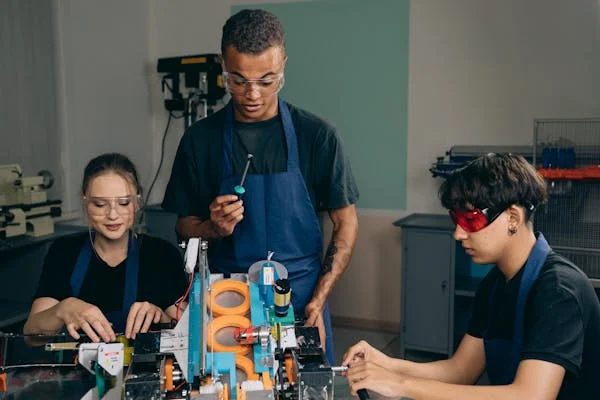This is How to Organize Youth Career Development Workshops

Organizing youth career development workshops is a complex and important process that involves careful planning and execution. In order to ensure that these workshops are successful in providing valuable information and resources to young individuals, it is important to follow a set of tips and strategies. In this article, I discuss 9 tips on how to organize youth career development workshops effectively.
Objectives and goals of the workshop
First and foremost, it is essential to clearly define the objectives and goals of the workshop. This will help in determining the content and structure of the workshop, as well as identifying the target audience and key topics to be covered. By setting clear goals, organizers can ensure that the workshop is focused and relevant to the needs of the participants. Once the objectives and goals of the workshop have been clearly defined, it is crucial to develop a detailed agenda outlining the specific activities and sessions that will take place.
This will help in ensuring that the workshop runs smoothly and efficiently, with each session contributing towards the overall goals. Additionally, organizers should consider incorporating interactive elements such as group discussions, case studies, and hands-on activities to engage participants and enhance their learning experience.

Research on current trends and requirements in the job market
It is important to conduct thorough research on the current trends and requirements in the job market. By staying informed about the latest developments in various industries and sectors, organizers can ensure that the workshop provides up-to-date and relevant information to the participants. This will help in preparing young individuals for the challenges and opportunities in the ever-evolving job market.
Additionally, organizers should also consider incorporating practical skills training and hands-on activities into the workshop agenda. By offering interactive sessions and workshops that allow participants to practice and apply their knowledge in real-world scenarios, attendees can gain valuable experience and confidence in their abilities. This hands-on approach can better prepare young individuals for the demands of the job market and help them stand out to potential employers.
Expertise in the field of career development
It is crucial to collaborate with experts and professionals in the field of career development. By inviting guest speakers and mentors who have experience and knowledge in various industries, organizers can provide valuable insights and guidance to the participants. This will give young individuals the opportunity to learn from the best in the industry and gain valuable advice on how to succeed in their chosen career paths.
Moreover, organizing networking events and job fairs can also be beneficial in connecting participants with potential employers and industry professionals. These events provide a platform for young individuals to showcase their skills and make valuable connections that can lead to internship opportunities or even job offers. By creating opportunities for participants to network and build relationships within their desired industry, organizers can further enhance the overall experience and impact of the career development program.

Interactive and engaging workshop
Fourthly, it is important to create interactive and engaging workshops that capture the attention and interest of the participants. By incorporating hands-on activities, group discussions, role-playing exercises, and other interactive elements, organizers can make the workshop more dynamic and impactful. This will help in keeping the participants engaged and motivated throughout the workshop.
Furthermore, organizers should consider incorporating technology into their workshops to enhance the learning experience. This could include using interactive presentation tools, online polls, or virtual breakout rooms to facilitate collaboration and engagement among participants. By leveraging technology, organizers can create a more immersive and interactive workshop environment that caters to different learning styles and preferences.

Practical resources for career development
It is essential to provide resources and materials that will help the participants in their career development journey. This includes providing handouts, worksheets, online resources, and other materials that will help in reinforcing the key concepts and ideas discussed in the workshop. Organizers should also provide information on further resources and support services that participants can access after the workshop. In addition to providing resources and materials, it is crucial for workshop organizers to create a supportive and engaging learning environment.
This can be achieved through interactive activities, group discussions, and opportunities for participants to practice and apply the skills they have learned. By fostering a collaborative and dynamic atmosphere, participants are more likely to stay engaged and motivated throughout the workshop.
Promote the works to attract youth
It is important to promote the workshop effectively to reach a wider audience of young individuals who can benefit from the information and resources provided. This can be done through social media, email newsletters, posters, flyers, and other marketing channels. Organizers should also reach out to schools, colleges, youth organizations, and other stakeholders to promote the workshop and encourage participation.
Moreover, it is crucial for organizers to tailor the workshop content to the specific needs and interests of the target audience. By conducting surveys or focus groups beforehand, organizers can gather valuable insights that will help them design a workshop that is engaging and relevant to young individuals. This personalized approach will not only attract more participants but also ensure that the workshop is impactful and beneficial to those who attend.

Supportive and welcoming environment
It is essential to create a supportive and welcoming environment for the participants. Organizers should ensure that the workshop venue is comfortable, accessible, and inclusive. They should also provide refreshments, breaks, and other amenities to ensure that participants are well taken care of during the workshop. This will help in creating a positive and encouraging atmosphere that will contribute to the success of the workshop.
Organizers should consider the diversity of the participants and ensure that the workshop content and activities are relevant and engaging for everyone. It is important to create a safe and welcoming environment where all individuals feel respected and valued. By promoting inclusivity and diversity, organizers can foster a sense of belonging and collaboration among participants, ultimately enhancing the overall workshop experience.
Feedback and evaluation
To have effective workshops in the future, it is important to incorporate feedback and evaluation mechanisms into the workshop to assess its impact and effectiveness. Organizers should gather feedback from participants through surveys, focus groups, and other methods to identify areas of improvement and learn from the experience. This will help in refining and improving future workshops to better meet the needs of the participants.
Organizers should consider incorporating interactive activities and group discussions during the workshop to encourage active participation and engagement from the participants. This can help create a more dynamic and collaborative learning environment, allowing for a deeper understanding of the material being presented. By fostering a sense of community and collaboration, participants are more likely to retain the information and apply it in their professional lives.

Follow up for additional support
To have a better continuity and effectiveness in the workshops, it is essential to follow up with participants after the workshop to provide additional support and guidance. Organizers should send out follow-up emails, newsletters, and other communication to keep in touch with participants and provide them with further resources and opportunities for career development. This will help in fostering long-term relationships with the participants and ensuring that the workshop has a lasting impact on their career development.
Conclusion on Youth career development workshops
Finally, it is important to continuously innovate and adapt the workshop to meet the changing needs and expectations of young individuals. By staying updated on the latest trends and developments in career development, organizers can ensure that the workshop remains relevant and effective in helping young individuals navigate the complexities of the job market. This will help in empowering young individuals to make informed decisions and pursue their career goals with confidence and success.
Frequently asked questions on Youth career development workshops
Youth career is a sensitive and important subject for discussion. It is extremely important for both an individual as well as for a country. It is that important because through their career youth make their economy and contribute to national economy through tax and production of their works which builds communities. The subject has attracted a number of questions and here are some of them:
- Youth career development workshops pdf?
- Free youth career development workshops?
- Career exploration for students?
- Career exploration for students pdf?
- Career exploration for high school students?
- What is career exploration?
- Career exploration for students example?
- Career exploration websites for high school students?
1 thought on “9 Essential Tips How to Organize Youth Career Development Workshops”